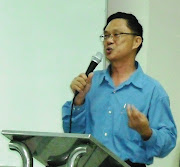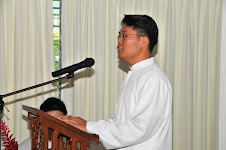
【片名】冬冬的假期
【译名】A Summer at Grandpa's
【时间】1984
【导演】侯孝贤Hsiao-hsien Hou
【主演】陈博正 / 古军
【语言】华语
【国家/地区】台湾
【IMDB评分】8.3/10
【获奖记录】
*1985年法国第七届南特三大洲国际电影节最佳剧情片奖;
*同年获第三十届亚太影展最佳导演奖,
*瑞士第三十八届洛迦诺国际电影节特别推荐奖


导读人:张吉安
Facilitator: Chong Keat Aun
(电影系讲师、节目制作人、主持人、行为艺术工作者、剧场工作者;曾任新闻记者、电影剪接师、编剧兼导演等。)
日期:2009年3月28日(星期六)
Date: 28 March 2009 (Saturday)
时间:下午2时至5时
Time: 2:00 p.m. to 5:00 p.m.
地点:吉隆坡总教区大众传播中心 (小戏院)
(圣安多尼圣堂旁边,同善医院对面)
Venue: Cahaya Suara (Auditorium)
Facilitator: Chong Keat Aun
(电影系讲师、节目制作人、主持人、行为艺术工作者、剧场工作者;曾任新闻记者、电影剪接师、编剧兼导演等。)
日期:2009年3月28日(星期六)
Date: 28 March 2009 (Saturday)
时间:下午2时至5时
Time: 2:00 p.m. to 5:00 p.m.
地点:吉隆坡总教区大众传播中心 (小戏院)
(圣安多尼圣堂旁边,同善医院对面)
Venue: Cahaya Suara (Auditorium)
【简介】
电影以毕业典礼为开场,在女同学夸张的抑扬顿挫的制式化演讲,与传统的离歌歌声中,我们好似随着毕业典礼中的同学,回到了孩童时期的纯真与单纯。
由于冬冬的母亲生病,无否照顾他和妹妹婷婷,于是,冬冬只好和妹妹随着小舅舅搭火车到苗栗的外公家里度过漫长的暑假。到了苗栗的冬冬,很快的就与当地的小孩打成一片,他们一起到河里游泳,一起穿梭于田野之间,还一起看到强盗抢夺午休工人财物的过程。冬冬的小舅舅与女朋友之间的一段感情,从不为外公所接受到最后的谅解,冬冬也彷佛有了一些似懂非懂的领悟。 这是侯孝贤给人感觉最明亮的一部电影,影片里充满了乡村的绿意,影片中没有太多沉重的心情,反倒是多了一些希望。而通过冬冬写给母亲的信,我们在画面之外似乎正和冬冬一起经历这一场成长之旅。镜头的特色一直是侯孝贤最为人所注意的特色,从《风柜来的人》开始,他独特的固定长镜头所表现出的情绪完整性,以及超越功能性空镜头的所谓“情绪性空镜头”,在《冬冬的假期》里,都继续带领观众走入他的电影中。
免费观赏 不容错过
请联络 周莉娜修女

A Summer at Grandpa’s (Hou Hsiao-hsien) 1984
Hou Hsiao-hsien’s easygoing but heartfelt tale A Summer at Grandpa’s is astutely told from a childlike point of view without falling into any of the pitfalls that hamper most movies with young protagonists.
Following Ting-Ting and Tung-Tung, a preteen brother and sister who must leave Taipei to live with their grandparents in the country one summer after their mother takes ill, the film has mature themes present, but in presenting them it never sacrifices the innocence that the children possess.
Talk about topics like abortion and armed robbery is frequent, but it’s the scenes where the children interact with each other that seem the most exciting, perhaps because so few films take delight in something as simple as watching children at play. When mature themes do arise, it’s usually through snippets of overheard dialogue that the children only partly comprehend.
Ting-Ting writes letters back home to his ailing parents that express his frustration that the motivations of the adults don’t make more sense, but Hou doesn’t leave the audience in the dark. His camera lingers after then children leave, giving us information that the children aren’t privy to. Instead of using his technique to distance his audience from the action, as he often opts to in his later films, the director’s tone here is inclusive and warm. There are hints at the panning, master-shot dominated style that would later come to define Hou’s distinctive work, but mostly his direction is more conventional in Grandpa’s. Hou’s relative invisibility serves the story, however, allowing the mood, pretty scenery, and accomplished naturalistic performances to take centre stage.
Organised by: Cahaya Suara Communications Centre, 5 Jalan Robertson, 50150 Kuala Lumpur.
主办单位
Tel: 03 – 20780912 (Mr. Paul)
Fax: 03 – 20317603










没有评论:
发表评论